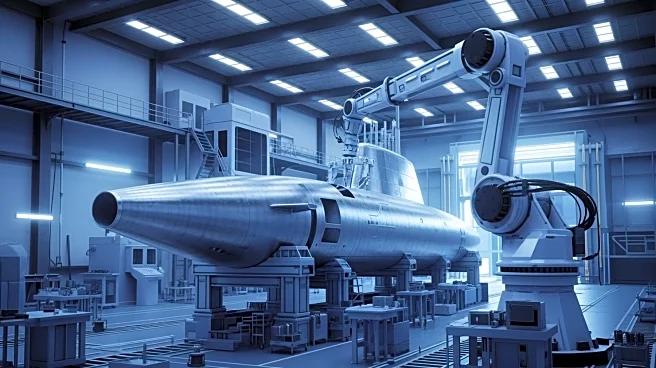What's Happening?
The South Korean-owned Philly Shipyard in the United States is currently unable to build a nuclear-powered submarine, as stated by South Korea's Prime Minister Kim Min-seok during a parliamentary hearing.
This statement follows President Trump's recent social media post claiming he had approved South Korea's request to build a nuclear-powered submarine at the Philadelphia shipyard. The request was made by South Korea's President Lee Jae Myung during a summit, seeking fuel for submarines equipped with conventional weapons. Despite Trump's approval, Prime Minister Kim clarified that the Philly Shipyard does not possess the necessary capability for such construction. South Korea's Defence Minister Ahn Gyu-back suggested that building the submarines in South Korea would be more rational due to the country's shipbuilding expertise, although this has not been formally discussed between the two nations.
Why It's Important?
The inability of the Philly Shipyard to construct nuclear-powered submarines highlights potential challenges in U.S.-South Korea defense collaboration. This development could impact strategic military planning and defense capabilities, as South Korea seeks to enhance its naval power amidst regional tensions. The situation underscores the importance of aligning technological capabilities with strategic defense goals. For the U.S., ensuring that allies like South Korea have the necessary resources and infrastructure to support defense initiatives is crucial for maintaining regional stability and countering threats. The issue also raises questions about the feasibility of President Trump's commitments and the practicalities of international defense agreements.
What's Next?
The U.S. administration, led by President Trump, plans to work closely with the Department of State and Department of Energy to fulfill the commitment to South Korea regarding the submarines. This collaboration aims to strengthen the defense capabilities of U.S. allies. However, the practical execution of this plan may require further discussions and assessments of the shipyard's capabilities. South Korea may need to explore alternative options for submarine construction, potentially leveraging its domestic shipbuilding expertise. The ongoing dialogue between U.S. and South Korean defense officials will be crucial in determining the next steps and ensuring that strategic defense objectives are met.
Beyond the Headlines
The situation presents broader implications for international defense cooperation and technological transfer between allies. It highlights the complexities involved in defense agreements, where political commitments must align with technical capabilities. The issue also reflects the strategic importance of naval power in geopolitical dynamics, particularly in the Asia-Pacific region. As South Korea continues to develop its defense infrastructure, the collaboration with the U.S. could influence regional security policies and alliances. Additionally, the focus on nuclear-powered submarines underscores the evolving nature of military technology and its role in national security strategies.











